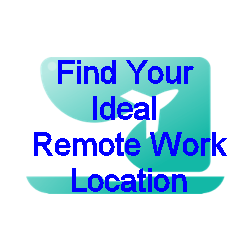Scandinavia has long been lauded as one of the most desirable places to live in the world. But up until recently it’s been nearly impossible to work there remotely. That all changed in 2016, when Sweden passed a law that made it possible to be paid to work remotely anywhere in the world. That is as long as you’re also legally employed by an employer in Sweden.
Scandinavia is a region known for its progressive work culture and emphasis on work-life balance. Whether you’re an employee seeking remote job opportunities or an employer considering implementing remote work policies, here are some insights and strategies for success.
The coffee shop culture
Not only do Scandinavians love their coffee, but they also know how to enjoy it. Many co-working spaces offer free drinks, refreshments and snacks. This ensures that you won’t be distracted or stressed by hunger or caffeine withdrawal. The result? A relaxed environment where you can focus on work and productivity.
The good life
Scandinavia has consistently been ranked by experts as one of most happy places on earth. You might be inclined to think that it’s because of all that gorgeous, pristine nature surrounding them. However, recent research shows it has more to do with their working habits. These countries are all small, which allows you to get involved in multiple communities and build a strong support system when you work remotely.
Cost of living
It might be tempting to hop from city to city based on where you can get housing for next to nothing. Cheaper rent isn’t always worth it. In many big cities, even your basic necessities—like groceries and gas—will cost more than what you’d pay for them elsewhere. If you want to save money, stay put in one location that has reasonable prices across all categories. Consider making friends with locals who have inside tips.
Work-life balance
Scandinavians seem to have it figured out. Sweden and Norway are consistently at or near the top of lists that measure work-life balance. Some data suggest they’re happier than Americans. So what’s their secret? Experts say it comes down to one thing: freedom. While Americans see working long hours as an achievement, Scandinavians would rather make time for family, friends, and recreation—and achieve success on their own terms.
Office space
If you’re looking for an office space, consider joining what’s known as a coworking space. These are shared environments where a group of like-minded business people will share office spaces, expenses and ideas while maintaining their own independent identity. To find one near you, try searching online for something like coworking spaces [your city].
Timezone benefits
By working remotely from one of these countries, you can enjoy long daylight hours. For example, during summer months, employees in Denmark have around 20 hours of sunlight each day. If you are an early riser and need to wake up with your team each morning, you’ll find that starting work later at 9:00am will allow plenty of time to prepare for a productive day before heading home by 5:00pm. With late-night cravings gone, there are fewer temptation issues to resolve as well!
Free healthcare and education for expats
It’s easy to set up as an expat in Sweden, and you can make your life here quite affordable, even on a remote-working salary. The first major benefit you’ll notice when starting your working life here is that healthcare and education are free – both for Swedish nationals and expats. Sweden has one of Europe’s most generous welfare systems: all citizens get free access to healthcare, basic dental care and public schooling; university education is also subsidised by 80%.
Annual holiday allowance
Many Scandinavians are entitled to an annual holiday allowance. This is usually around four to six weeks’ worth of paid time off, although some nations offer more and others less. And as long as you’re working for a single employer, it doesn’t matter how many jobs you hold—if you work freelance or are self-employed, however, then it gets complicated.
Challenges of Working Remotely
While there are numerous benefits to working remotely in Scandinavia, it’s important to be aware of the potential challenges:
Isolation and Loneliness
Working from home or in a remote location can sometimes lead to feelings of isolation. The absence of in-person interaction may require remote workers to be proactive in seeking social connections and maintaining a sense of community.
Communication and Collaboration
Effective communication is vital for remote teams to collaborate successfully. Without face-to-face interactions, it’s crucial to leverage digital communication tools and establish clear channels for sharing information and ideas.
Time Management and Self-Discipline
Remote work requires self-motivation and discipline. Without the structure of a traditional office environment, individuals must manage their time effectively and establish routines that promote productivity.
Popular Remote Jobs in Scandinavia
Scandinavia offers a wide range of remote job opportunities across various industries. Some popular remote jobs include:
Software Development and Programming
The tech industry in Scandinavia is thriving, and remote software developers and programmers are in high demand. Companies often hire remote professionals for projects that require specialized coding skills.
Digital Marketing and SEO
With the increasing importance of online presence, companies seek remote professionals who can optimize their digital marketing strategies and improve search engine rankings.
Graphic Design and Creative Services
Remote graphic designers and creative professionals are sought after for their ability to deliver visually appealing designs and branding materials.
Content Writing and Copywriting
Companies require talented remote writers to produce engaging content for websites, blogs, and marketing materials.
Virtual Assistance and Administrative Support
Many businesses in Scandinavia outsource virtual assistants who provide administrative support remotely, helping to streamline operations.
The Future of Remote Work
The future of remote work in Scandinavia looks promising. With increasing technological advancements, evolving work cultures, and a growing demand for work-life balance, remote work is expected to continue expanding. Embracing remote work provides opportunities for companies to attract top talent, reduce overhead costs, and promote sustainable work practices.
Frequently Asked Questions
Can anyone work remotely in Scandinavia?
Yes, remote work opportunities are available to individuals across various industries and professions. However, it’s important to check the specific visa and work permit requirements based on your nationality and the country you intend to work in.
Are there tax implications for remote workers in Scandinavia?
Tax regulations can vary depending on your home country and the country where you are working remotely. It’s advisable to consult a tax professional or seek guidance from the relevant authorities to understand your tax obligations.
Conclusion
Working remotely in Scandinavia offers numerous benefits, including increased flexibility, improved work-life balance, and access to a global talent pool. While there are challenges to overcome, effective communication, proper work-life boundaries, and utilizing the right tools and technologies can lead to successful remote work experiences. As remote work continues to shape the future of work, embracing its possibilities can lead to enhanced productivity, employee satisfaction, and business growth.



